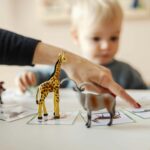
Top tips: supporting children’s early language skills
Top tips to support children’s vocabulary and early language skills

Research tells us that a child’s language development at the age of 2 years can predict children’s performance on entry to primary school and their future educational success (more on this later).
The earliest years are crucial for a child’s future success and it is incredibly important that early years practitioners have the skills and knowledge to support and develop each individual child’s communication and language skills. This is particularly important for children that come from disadvantaged backgrounds.
As NDNA launches a new online course, Vocabulary and Early Language Skills, here are some top tips to think about when working with children in early years:
Tip number 1 – Understand the key terms
Vocabulary: all the words known and used by a particular person. All the words that exist in a particular language or subject
Speech: the term used to mean spoken language.
Language: a system of communication consisting of sounds, words, and grammar, or the system of communication used by people in a particular country or type of work. To use and understand a language, you have to know the symbols and the rules.
Communication: the imparting or exchanging of information by speaking, writing or using some other medium
Tip number 2 – Early Years Practitioners can help make a difference to disadvantaged children
There are huge differences in the level of language some children are exposed to. Some children have rich language experiences in their home whilst some children have limited quality interactions with adults. Research has shown that children from more deprived backgrounds hear a lot less words at home, which can lead to poorer outcomes in the future. (Hart and Risely (1995)).
A child’s earliest years are a critical time to develop the skills children need for future success. In the early years, language and communication skills underpin all other areas of learning and development. In your activities with children, early years practitioners can help make up the difference in language by providing rich and varied experiences for children to hear vocabulary, through poetry and rhyme, stories, both written and oral, providing a narrative, asking appropriate questions and using play activities to develop and widen vocabulary experiences.
Tip number 3 – Play is central to communication
Play is central to communication. Through their play activities children can play with words and sounds, develop a narrative for what they are doing and thinking, make up and tell stories, interact in social groups, solve problems and express their thoughts and ideas. Activities and resources that promote curiosity and wonder within the nursery are great for encouraging children to use words and expressions.
Equally, quiet spaces and areas for children to take time out and gather their thoughts will also help.
Tip number 4 – How practitioners can support language development
Language does not ‘just happen’. It needs dedicated and knowledgeable practitioners who understand how children acquire language.
The development of children’s spoken language underpins all seven areas of learning and development. Children’s back-and-forth interactions from an early age form the foundations for language and cognitive development. The number and quality of the conversations they have with adults and peers throughout the day in a language-rich environment is crucial. By commenting on what children are interested in or doing, and echoing back what they say with new vocabulary added, practitioners will build children’s language development.
Adults need a good knowledge about how children develop their language and communication skills, how they can support high quality interactions, different types of questioning to match a child’s stage of development, the processing time children need before formulating a response, the different stages of communication, active listening and how to put all of these skills into play experiences for all children.
Tip number 5 – Learn more through NDNA’s online course – Vocabulary and Early Language Skills
NDNA’s online course will help practitioners to create a nursery environment that is effective for developing language and vocabulary. It is designed to give practitioners the ability to support children’s vocabulary and early language skills.
Key topics include
- Develop strategies for identifying and supporting children with communication difficulties, including children with English as an additional language (EAL) and non-verbal children
- Understand theoretical perspectives on language development in relation to own practice
- Developing a language rich environment
- The magic of stories to support and develop vocabulary
- Home learning environment – strategies to support language development
Visit https://ndna.org.uk/product/vocabulary-and-early-language-skills-2/ to find out more.
Similar Articles
Early years activity: Mini movers obstacle challenge

Top tips: Inclusion in action


